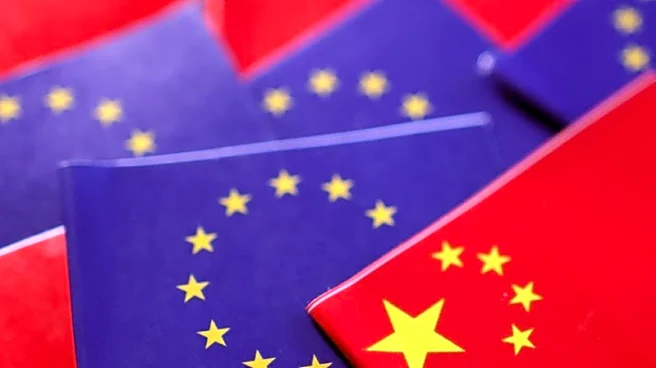What's Happening?
Virginia Attorney General candidate Jay Jones faced criticism during a debate with incumbent Attorney General Jason Miyares. Jones, a Democrat, has been under scrutiny following the revelation of text
messages in which he expressed a desire for a mother to witness her children die. Despite the controversy, Jones used the debate to apologize for his remarks and promote his public safety plan, which includes measures to protect children. Miyares challenged Jones's credibility, citing endorsements from law enforcement associations urging Jones to withdraw from the race. The scandal has impacted Jones's standing in the polls, with Miyares now leading.
Why It's Important?
The controversy surrounding Jay Jones's candidacy highlights the impact of personal conduct on political campaigns. The backlash from his text messages has shifted the dynamics of the Virginia Attorney General race, affecting voter perceptions and potentially altering the outcome. The incident underscores the importance of public trust and accountability in political leadership, especially in roles involving public safety. Law enforcement endorsements against Jones further emphasize the significance of maintaining credibility and integrity in positions of authority.
What's Next?
As the election approaches, Jay Jones faces increasing pressure to address the fallout from his controversial remarks. The ongoing scrutiny may influence voter turnout and decision-making, with Miyares capitalizing on the situation to strengthen his campaign. The debate over Jones's candidacy could lead to broader discussions on political accountability and the role of personal conduct in public service. Stakeholders, including political leaders and advocacy groups, may weigh in on the implications for future elections and candidate vetting processes.
Beyond the Headlines
The situation raises ethical questions about the intersection of personal beliefs and political agendas. Jones's comments reflect broader societal debates on the influence of personal experiences on policy-making. The incident may prompt discussions on the ethical responsibilities of public figures and the impact of personal conduct on professional roles. Additionally, the controversy could lead to increased scrutiny of political candidates' backgrounds and the importance of transparency in public service.











